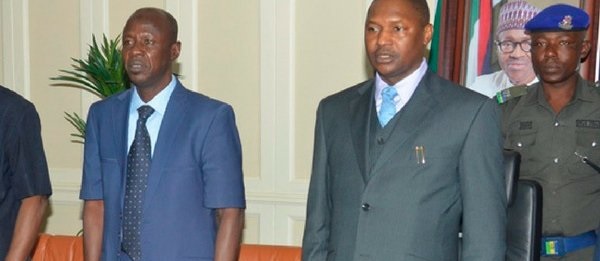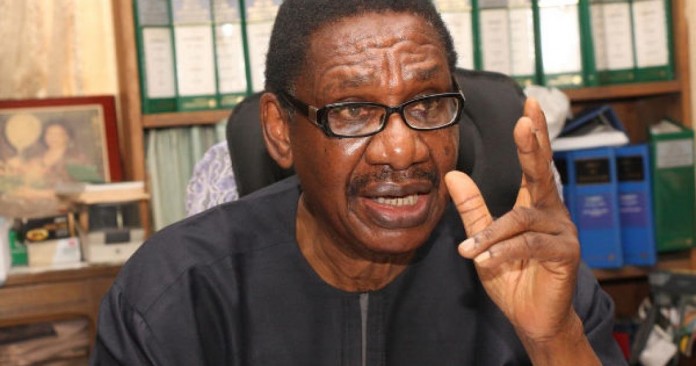By Olumide Bajulaiye
Sympathizers of Mrs. Chinelo Amazu Ahonu have persistently criticized as illegal, her disengagement by the federal government before the expiry of her tenure as Director-General of Pencom. Facts were either ignored or twisted to give credence to a convenient interpretation of the Pension Reform Act 2014 to buttress this argument. It was further argued that Amazu was doing an incredible work at Pencom and her sudden exit was negatively affecting the stability and progress of the agency and the pension industry.
Thus, when recently on the eve of President Muhammadu Buhari’s return from medical vacation, the federal government announced that the second set of nominees to the executive management offices of Pencom should report to work in acting capacity, supporters of Amazu re-launched their media offensive to push forward the narrative of illegality of the government’s decision to sack her and called for her reinstatement.
Of course, the federal government’s directive is yet to be realized in view of the Senate’s position that the nominees could not assume duties until they are confirmed by it.
At the onset of Amazu’s disengagement, two cases were instituted at the Federal High Court, Abuja by individuals and organizations of Igbo extraction, challenging the legality of her disengagement and nomination of first, Mr. Aliyu Abdulrahman Dikko (from North-West) and later, Mr. Funsho Doherty (from South-West). It was argued that, should Amazu’s disengagement remain, her replacement must come from the South-east zone. While we await the argument of lawyers and the verdict of the court in these cases, there is a compelling need to present another perspective to the conversation, especially in the light of persistent publications on the subject.
Advertisement
Amazu’s sojourn in the pension commission presents an interesting trajectory of controversy and impunity from entrance to exit. Readers following developments in the pension industry from its inception in 2004 would recall the controversy surrounding her appointment as Company Secretary and Legal Adviser on director level, despite the fact that she lacked the requisite experience for that office and grade as stipulated in the Public Service Rules. She served as Director in the agency until December 2012, when she was appointed by the President Goodluck Jonathan administration as Acting Director-General following the exit of the pioneer executive management led by Mr. M. K. Ahmed. This was also done in defiance of the Federal Government Public Service Policy introduced by the President Yar’Adua administration, mandating the retirement of directors who served for eight years in office.
Amazu continued in office as Acting Director-General and Sole Administrator of Pencom from December 2012 to December 2013 when Jonathan appointed her as Executive Commissioner and Acting Director-General along with other three Executive Commissioners and Alhaji Ahmed Muazu as Chairman. The controversial amendment of the Pension Reform Act to lower the qualifying experience for appointment as Director-General of Pencom was done in 2014. It is common knowledge that the amendment was done to pave the way for Amazu’s appointment as substantive Director-General, which was consummated in October 2014. Since then, she continued in office until April 2017, when she was disengaged by the Buhari administration along with the managements of other Federal Government parastatals.
Indeed, it was reliably related that when the Federal Government’s disengagement order was issued to the affected agencies, Amazu refused to vacate office until she was forced out by State Security Services operatives. That was the beginning of the resistance against her disengagement, which is being advanced in the media and the law courts as well as in political and sectional circles. This resistance has persisted without minding the fact that the personality involved indeed thrived in impunity. Certainly, those who live by the sword, die by the sword.
Advertisement
What specific progressive projects and policies introduced and executed by Amazu for Pencom or the pension industry have been jeopardized by her recent exit as alleged by her supporters?
It is claimed that she introduced a yearly World Pension Summit for Africa, which the officials confirmed were hosted by Pencom at a huge cost for the three years it was held. Furthermore, operators in the industry vehemently complained that they were forced to participate at the summit for high fees denominated in foreign currency. That was in addition to forcing the administrators to contribute huge sums to a social responsibility project for the procurement of a machine for the treatment of prostate cancer at a huge cost.
Some of her legacies itemised include some staff welfare programmes, introduction of the micro-pension scheme for the informal sector and opening of zonal offices in the six geopolitical zones. However, the zonal offices were said to have been established by the pioneer executive management and that Amazu merely performed the commissioning ceremonies for the offices. There were also staff recruitment exercises undertaken by her for which the House of Representatives Committee on Federal Character had severally queried its lop-sidedness in favour of her state of origin.
Yet operators were frustrated by Pencom’s inability to finalise and issue revised regulations and guidelines during her superintendence since the enactment of the 2014 Act. The regulation on investment of pension fund was only issued in April 2017, on the eve of her exit from the agency. Why was Pencom unable to resolve the issues inhibiting the opening of the transfer window, which the pension industry and contributors had been waiting for since the time of the pioneer executive management? Amazu’s inability to resolve the challenges obviously necessitated the regulatory action taken by the agency on First Guarantee pension fund administrator.
Advertisement
Finally, it is safe to leave the legality of Amazu’s disengagement for the court to decide since the issues have been presented before it. However, it should be noted that the Pension Reform Act gives the President the power to remove any or all members of the Pencom executive management in public interest. Where the whole team was disengaged, it does not require a lawyer to realize the illogicality of the argument that the next Director-General must necessarily come from the South-east. The argument would have been valid had there been occasional vacancy in Pencom created by exit of any individual member of the executive team, because the President would be compelled to appoint a replacement from the zone of the exited member in order to maintain the federal character principle stipulated in the Pensions Act.
In addition, Section 106(4) of the Act gives the President the power to appoint an entirely new board for the agency in the event that a new board has not been constituted more than six months after the dissolution of the previous board. It is a known fact that the boards of all agencies of the Federal Government were dissolved in 2015, which was almost two years by the time Amazu was relieved of her appointment.
The Federal Government must, therefore, not succumb to the ethnic and baseless clamours for the reinstatement of Amazu. Indeed, Nigerians must give credit to the pioneer executive management of Pencom for laying a solid foundation for the agency, such that the career staff are currently smoothly and competently navigating the tides of politics and ensuring regulatory stability in the pension industry. That is the sort of institutional stability we should focus on, evaluate and customize for adoption by other public institutions in Nigeria.
Olumide is a public affairs commentator based in Abuja.
Advertisement
Views expressed by contributors are strictly personal and not of TheCable.
Add a comment






